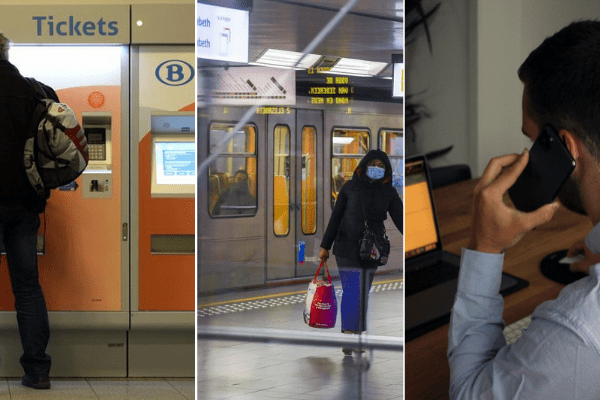As always, a new month brings new changes. From adjusted public transport fares to a ban on calls to public servants after-hours, here is what will change on Tuesday 1 February 2022.
Travel fares
As it does every year, national railway company SNCB will adjust its tariffs on 1 February. This year the cost of commuter and school season tickets will increase by 2.14%; the cost of standard tickets will increase by 1.63%.
However, the cost of leisure travel for young people (Youth Ticket, Youth Multi and Youth Holidays) and for seniors (over 65) will remain unchanged, as the railway company wants to make rail travel more attractive.
The ten-ride Standard Multi ticket (formerly Rail Pass) will become €1 more expensive and the Local Multi ticket meant for short distances within a certain zone will be reduced by €1 to €27 for ten rides.
Finally, the intermodal transport tickets that travel between the capital and suburbs (SNCB, STIB, Tec and De Lijn) will also increase in price. Brupass XL will now cost €3.10 euros per journey instead of €3, while a Brupass XL annual pass will cost €780 (+€5).
Within Brussels, public transport operator STIB will decrease the youth fare pass to €12 for all residents aged between 18 and 24, even those who are not students. From July last year, students were able to get the pass (which used to cost €499) for a reduced price.
Meanwhile, the bicycle-sharing company Blue-bike is increasing its rates. The standard rate for the first 24 hours will rise from €3.15 to €3.50 in the country's largest cities. At other locations, an additional €0.35 will be added, and a ride will cost €1.50 for the first 24 hours. The annual subscription fee remains €12.
Right to disconnect
From 1 February, federal civil servants will no longer have to answer phone calls from their boss outside of usual working hours. This “right to disconnect” is part of "the fight against excessive professional stress and burn-out."
Unless “in the event of exceptional and unforeseen circumstances requiring action that cannot wait until the next working period,” staff members cannot be contacted after-hours, according to a circular from Public Service Minister Petra De Sutter.
De Sutter stressed that the employee “should not be disadvantaged by not answering the phone or reading work-related messages outside normal working hours.”
Guaranteed income insurance for cancer patients
Insurers will no longer be able to use a cancerous pathology as grounds to refuse an application for guaranteed income insurance, which covers the loss of income following incapacity to work of the insured due to illness and/or an accident.
Under the conditions for the so-called "right to be forgotten," a period of ten years must have elapsed since the end of successful treatment without the need for further treatment for cancer. The only exception is for treatment such as hormone prevention therapy, which may have been carried out during the ten-year period.
To qualify, the candidate must not have suffered a relapse during this ten-year period and cannot have been unable to work as a result of their illness.
This right to forget already existed for the outstanding balance insurance, which covers the full or partial mortgage loan amount in the event of death, since 1 February 2020.

